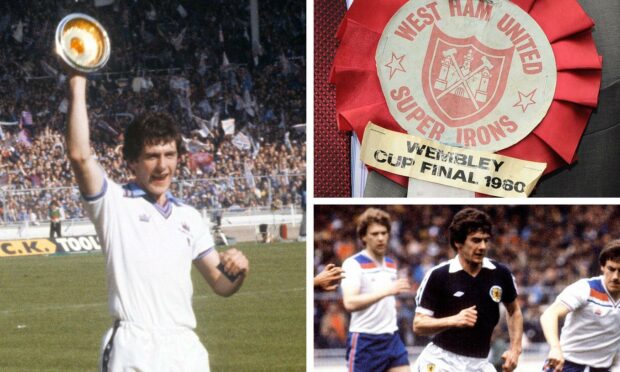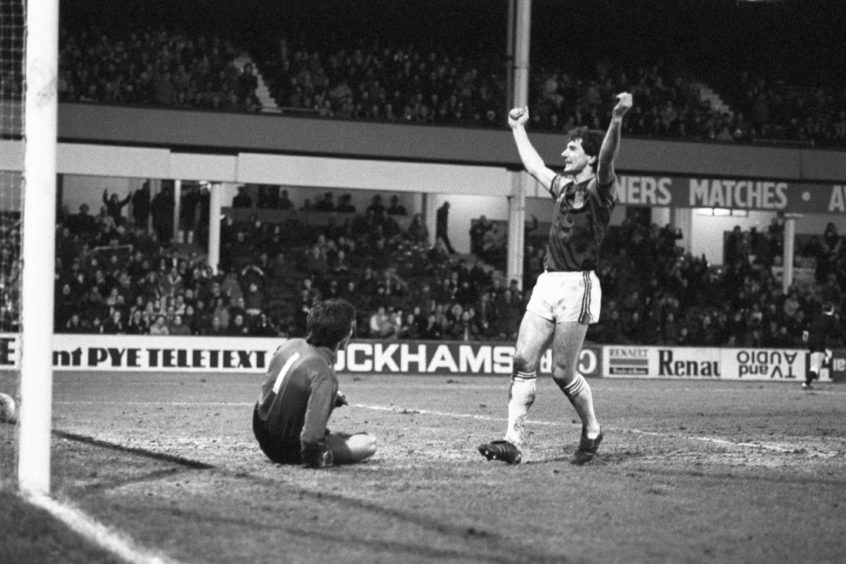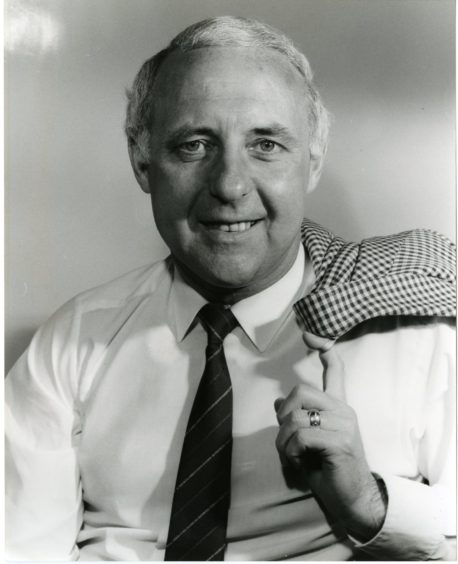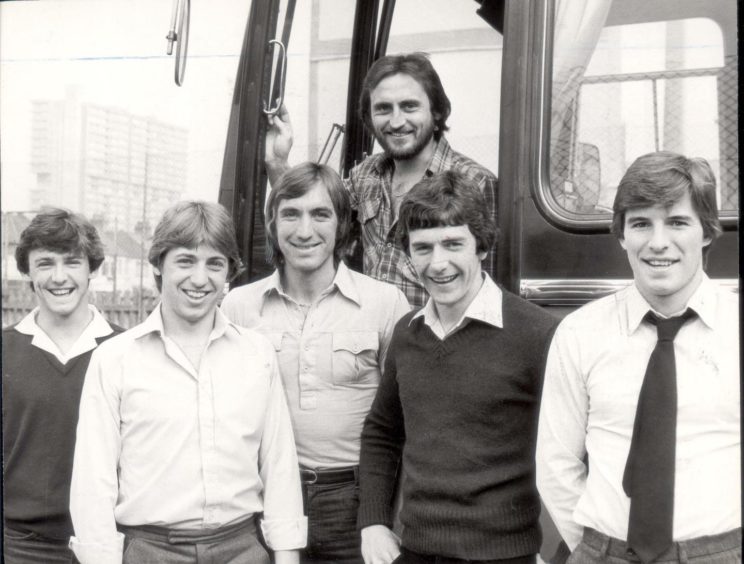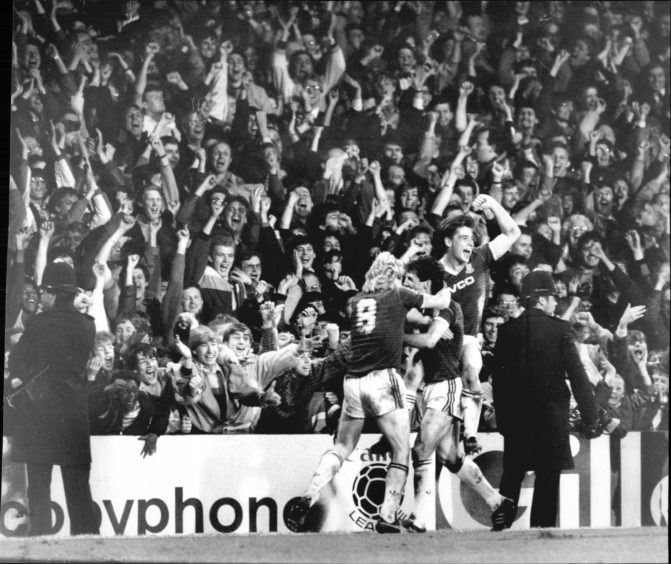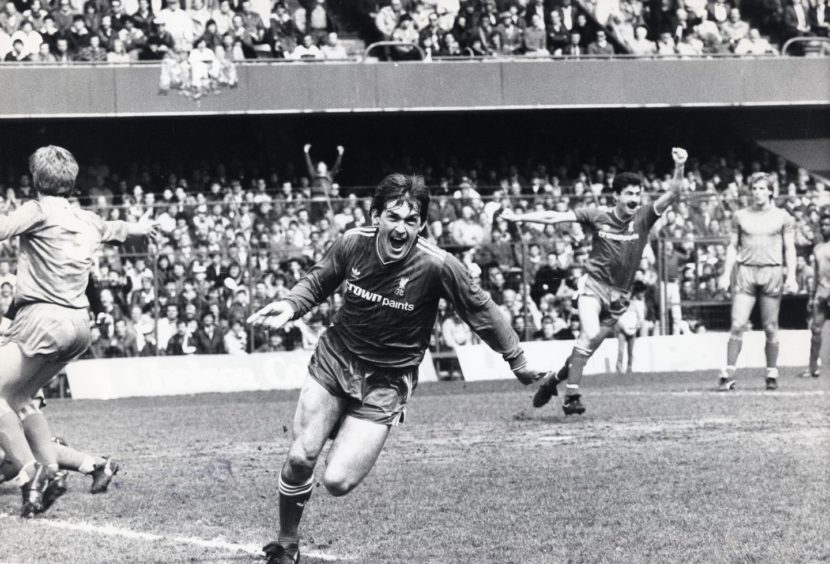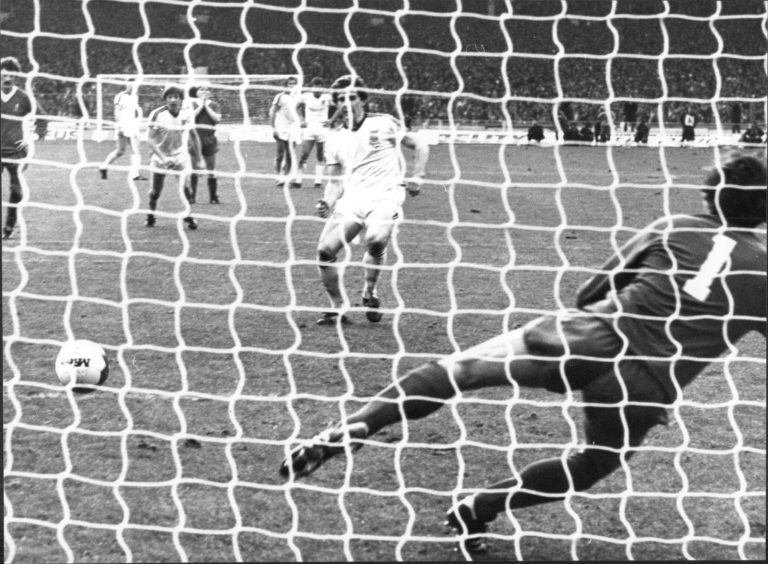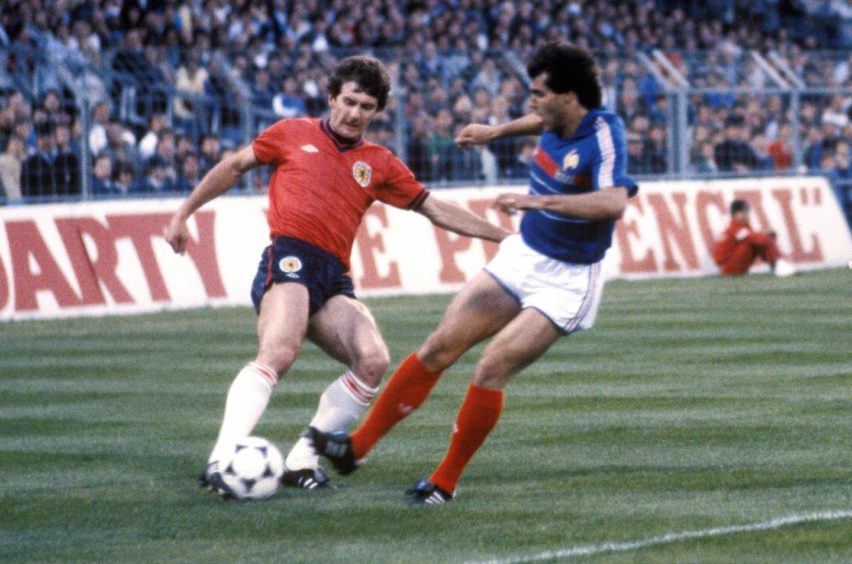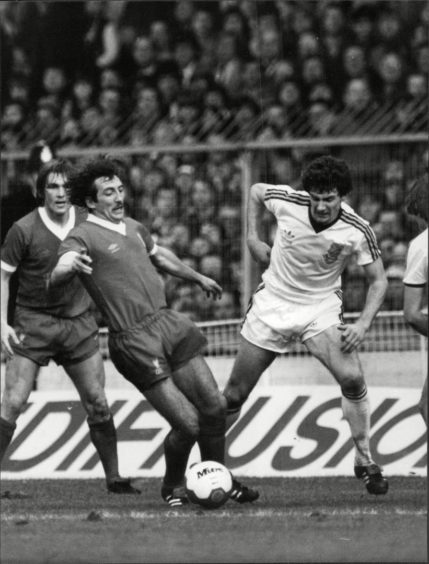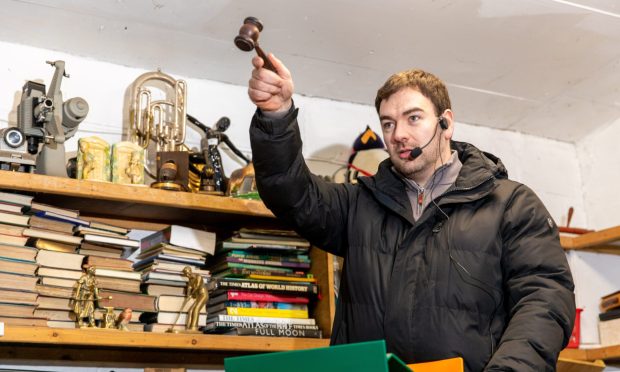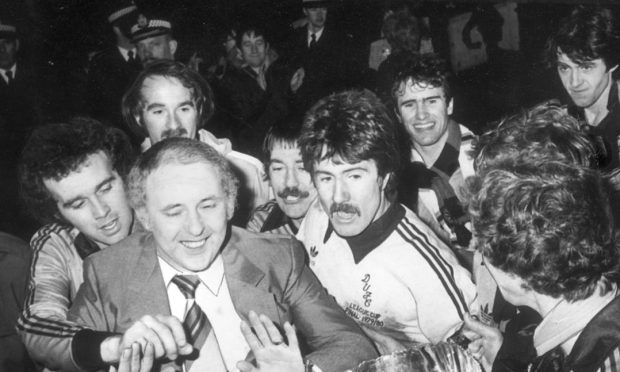Jim McLean gave 16-year-old Ray Stewart a man-marking job on Kenny Dalglish when he made his Dundee United debut in 1976.
The Stanley boy was nurtured by McLean and rose through the ranks at Tannadice where he was described by Andy Roxburgh as United’s “Franz Beckenbauer”.
Roxburgh was in charge during a heady time for youth football and Stewart was captain when Scotland finished fourth at the European Under-18 Championship in 1978.
He became Britain’s most expensive teenager when he signed for West Ham in 1979 for £430,000 and was known as the penalty king during his 12-year spell.
The Perthshire villager took the big city by storm and was part of the 1980 FA Cup-winning side and The Boys of 86 side which almost won the league.
The former Perth Grammar pupil also won 10 Scotland caps and clocked up more than 400 appearances for West Ham where he became a club legend.
Ray grew up playing football in Stanley
Stewart was born in Stanley on September 7 1959.
He grew up kicking a ball around the streets and used to pretend to be Perth-born Newcastle United defender Bobby Moncur.
Stewart signed an S-form with Dundee United at the age of 13 in May 1973 when he was playing for Errol Rovers after his raw talents were spotted by Jim McLean.
Stewart went on to captain Scotland at schoolboy level while playing for Errol Rovers before signing a professional contract with United at the end of 1975.
He began playing regularly for the reserve team before McLean gave him his debut against Celtic in a League Cup sectional tie at Parkhead in 1976.
Stewart was played in midfield just days before his 17th birthday and given the job of man-marking Kenny Dalglish in the game which finished 1-1.
He became a first team regular during the 1978-79 season and played in all but two league matches and won the SPFA Young Player of the Year award.
Britain’s most expensive teenager
Stewart attracted interest from south of the border and West Ham bought him for £430,000 in August 1979.
He became Britain’s most expensive teenager and part of the fee received was reinvested in the construction of the covering for the north terracing.
Stewart’s career at West Ham will be fondly remembered by fans of that era not just for his resolute defending, but also his fantastic penalty taking record.
He was given the nickname ‘Tonka’ for his ferocious striking of the ball.
Stewart played in defence with Frank Lampard, Alvin Martin and Billy Bonds and scored the first of his 76 successful penalties during a 2-1 victory over Burnley.
His penalty taking style made him a fan favourite and he won the FA Cup in 1980 as a second-tier side when Trevor Brooking scored in a 1-0 win over Arsenal.
West Ham reached the League Cup Final, the European Cup Winners’ Cup quarter final and secured promotion to the top flight the following year.
Stewart actually scored in double figures four times in his first seven seasons at West Ham.
He went on to play 10 times for Scotland but said the “only time I ever had tears in my eyes was when Dalglish scored on that final day of the season in 1986 and Liverpool won the title instead of us”.
Stewart was one of the Boys of 86
Many consider The Boys of 86 to be the best West Ham side ever.
At the start of the season there was nothing to suggest they would challenge for the title after winning two of their last three matches to beat the drop in 1984-85.
Manager John Lyall brought in winger Mark Ward from Oldham and striker Frank McAvennie from St Mirren after Paul Allen and Dave Swindlehurst departed.
McAvennie formed a lethal strike partnership with Tony Cottee.
Stewart played 39 games and West Ham challenged for the title with a realistic chance of winning the league going in to the final Saturday of the season.
But it wasn’t to be.
Liverpool’s 1-0 victory at Chelsea saw them clinch the first part of the double with Kenny Dalglish scoring the winner.
West Ham would also miss out on second place and finished third.
Stewart was badly injured in a game against Derby County in January 1989 and was out of action for 15 months before making a return in April 1991.
When he returned, he was never the same player and when his contract expired in the summer, he left the club, having played 434 times for the Hammers.
He was given a free transfer and joined St Johnstone for a season before going in to coaching and then management with Livingston, Stirling Albion and Forfar.
How many penalties did he miss?
Tony Hanna, who writes nostalgia articles for West Ham Till I Die, said Stewart added steel and tenacity at right back during the halcyon days of the 80s.
“All but eight of his goals were from the penalty spot and at least three of those eight were from the goalkeeper’s initial saves from the penalties,” he said.
“There are differing views on how many penalties Ray actually missed during his West Ham career and Ray himself, when asked, does not include the ones where he followed up with these rebounds.
“Initial misses are most likely to be around 10 as most stats say he scored 76 from 86 attempts.
“From my personal view the two most important penalties he ever took were in the quarter final of the FA Cup in 1980 against Aston Villa and in the League Cup final the following year at Wembley against Liverpool.
“Both were highly pressurised and important and Ray belted both of them home!
“And belt them he did.
“His style was no nonsense and hit with such power that both his feet ended up off the ground after striking the ball.”
Should he have won more caps?
Tony said that whilst many Scots played for the Hammers in the first 70 years of their history, none were of international quality.
It wasn’t until 1959 that West Ham had their first Scottish International player – when John Dick earned his one and only cap.
“We would have to wait a further 22 years before we got another Scottish full international in Ray Stewart,” said Tony.
“I am not sure why he didn’t get more Scottish recognition but I would imagine it had a lot to do with Celtic icon Danny McGrain being around at the time.
“I doubt many of our era would not have Tonka as our best ever right back.
“So why he is not revered more by the Scottish media is baffling, because at West Ham he was a fan favourite.”
Stewart will always be remembered
But what of the man himself?
Stewart still tries to get down to a few West Ham games every season.
“I’ve said it many times before, I’ll never ever forget how I was welcomed into this club by everyone when I moved down from Scotland as a 19-year-old – that will stay with me forever,” he said.
“I feel it as soon as I walk back into the area and bump into a fan who says ‘Hello Tonka, how are you mate?’
“It’s a special feeling and it means a lot to me.”
Stewart was honoured with a commemorative stone in the Champions Place area outside the London Stadium when West Ham moved from Upton Park.
“Whenever I’m asked what the most special thing is about West Ham my answer is the same,” he aid.
“The people.
“I always say the Cockneys of east London took me into their hearts when I joined the club and made me one of them – or a ‘Jockney’ as some people called it!
“I made lifelong friends and still have a special relationship with the supporters.
“The fans are the one constant at any football club and especially at West Ham, where they are fiercely loyal.”
